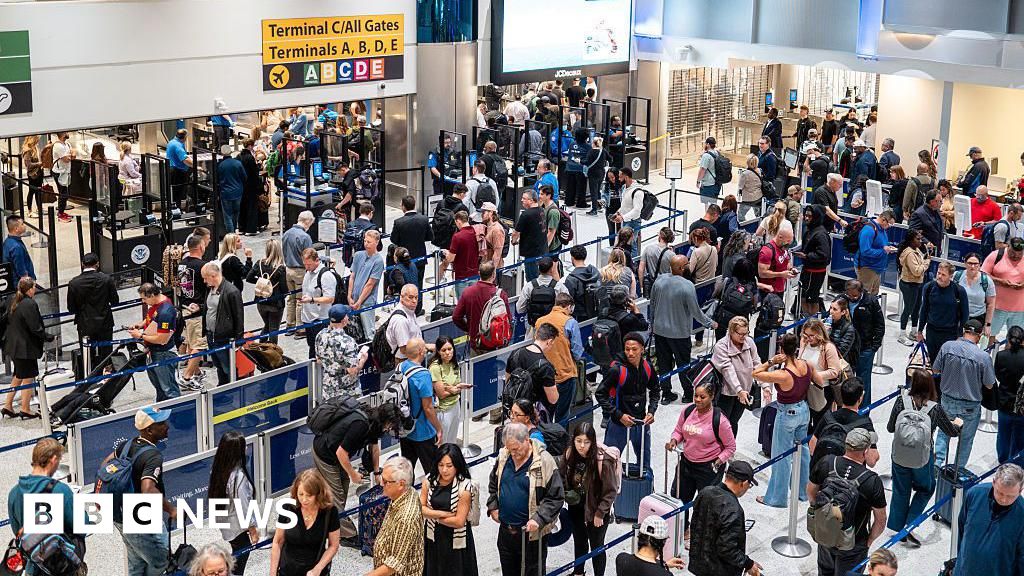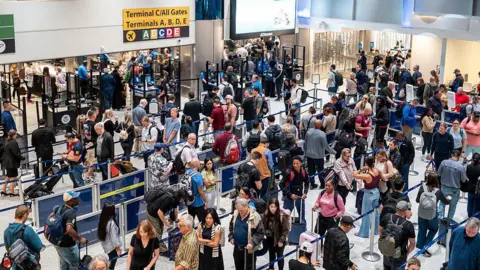Business
More than 1,000 flights cancelled as US air traffic cuts enter second day

 Getty Images
Getty ImagesMore than 1,400 flights to, from, or within the US were cancelled on Saturday after airlines were told this week to cut traffic during the federal government shutdown.
Nearly 6,000 flights were also delayed, down from over 7,000 delays on Friday, according to flight tracker FlightAware.
The Federal Aviation Administration (FAA) announced earlier in the week that it would be reducing air travel capacity by up to10% at 40 of the nation’s busiest airports as air traffic controllers, who are working without pay during the shutdown, report fatigue.
Republicans and Democrats remain divided over how to end the impasse in Congress as the shutdown, which began 1 October, continues.
Saturday marked the 39th day of the longest shutdown in history as Republicans and Democrats still have not agreed on a funding resolution to reopen the government.
Senators are in Washington over the weekend for bipartisan negotitations aimed at ending the shutdown, which is beginning to be felt by more and more Americans amid cuts to food aid payments and the flight disruptions.
In a statement on Saturday, American Airlines urged “leaders in Washington, D.C., to reach an immediate resolution to end the shutdown”.
New Jersey’s Newark Liberty International Airport was experiencing some of the longest wait times. As of Saturday afternoon, arrivals to the airport were delayed by an average of more than four hours, while departures from the airport were delayed by an average of 1.5 hours, according to the FAA.
The airports with the most cancelled flights on Saturday, both to and from the location, were Charlotte/Douglas International, Newark Liberty International, and Chicago O’Hare International, according to FlightAware.
Departures to John F Kennedy International, Hartsfield-Jackson Atlanta International, and La Guardia were delayed by nearly three hours, over 2.5 hours, and about an hour, respectively, the FAA reported as of Saturday afternoon.
With the Thanksgiving holiday approaching on 27 November, it’s one of the busiest travel seasons of the year in the US.
It’s not just commercial flights that have been affected. Restrictions on private jets are also in place, Secretary Duffy said in a Saturday post on X.
“We’ve reduced their volume at high traffic airports — instead having private jets utilize smaller airports or airfields so busy controllers can focus on commercial aviation,” Duffy wrote. “That’s only fair.”
And things will likely get worse in the coming days as the FAA increases the percentage of cancelled flights.
On Thursday, the agency announced that the flight reductions would be gradual, starting at 4% of flights on Friday before rising to 6% by 11 November, 8% by 13 November, and the full 10% by 14 November.
The FAA said the cuts were necessary to maintain safety as air traffic controllers have been overworked during the shutdown.
As essential workers, the controllers are required to continue working without pay, and as a result, many have called out sick or taken on second jobs to afford necessities, unions say.
The controllers are just some of the 1.4 million federal workers who have either been working without pay or been put on forced during the shutdown.
Another factor impacting air travel is that most of the Transportation Security Agency (TSA) 64,000 agents are also not being paid while the shutdown is in place.
During the previous government shutdown, under US President Donald Trump in 2018, it was found that up to 10% of TSA staff chose to stay at home rather than work for free.
Business
Why you should consider switching bank accounts

Martin Lewis explains why now might be a good time to think about changing your bank account.
Source link
Business
Video: The Hidden Number Driving U.S. Job Growth

new video loaded: The Hidden Number Driving U.S. Job Growth
By Ben Casselman, Christina Thornell, Christina Shaman, June Kim and Nikolay Nikolov
February 13, 2026
Business
How packaging and logistics companies are automating their warehouses

DHL Autonomous Robot at work.
Source: DHL
Workers at DHL Group used to walk close to a half marathon each day just to classify, pick and move items across massive warehouses.
Now, their distance and efforts are greatly reduced by autonomous mobile robots that can unload containers for the package delivery and supply chain management company with a speed of up to 650 cases per hour.
“That is what we look forward to, and where we’ve been successful in deploying technology at scale over the last five years, going from when we started in 2020 with 240 projects, and now we’re up to 10,000 projects,” Tim Tetzlaff, DHL’s global head of digital transformation, told CNBC.
The company’s autonomous innovations have accelerated processes at 95% of DHL’s global warehouses. Item-picking robots in one warehouse have increased units picked per hour by 30%, while autonomous forklifts at that same warehouse have contributed a 20% increase in efficiency, the company said.
Tetzlaff said automation is important for the company because it’s such a labor-intensive business.
“We still have the ambition to grow our business even further, but if you look at where these distribution centers should be located … it’s typically very tough to find additional labor or even additional spaces just to build these warehouses there,” he said.
DHL is one of multiple fulfillment companies moving toward automation and leveraging artificial intelligence as the industry works toward greater efficiency.
On an earnings call with analysts in late January, United Parcel Service CEO Carol Tomé said the company deployed automation in 57 buildings in the fourth quarter, bringing its total to 127 automated buildings, with plans for 24 more in 2026.
“This year, we plan to further automate our network and as a result, we expect to increase the percentage of U.S. volume we process through automated facilities to 68% by the end of the year, up from 66.5% at the end of 2025,” she said.
Similarly, FedEx has said it sees automation as an opportunity to enhance its workers’ jobs, installing robotic arms to help process small packages at its Memphis hub and working with AI company Dexterity to leverage robots for loading boxes into containers. Its “Network 2.0” initiative is working to increase the efficiency of its package processes.
The company recently announced a partnership with Berkshire Grey to launch a fully autonomous robot to unload containers and optimize operations.
It estimates that the global warehouse automation market is expected to exceed $51 billion by 2030.
“We now have about 24% of our eligible average daily volume flowing through 355 Network 2.0-optimized facilities,” CEO Raj Subramaniam said on a call with analysts in December.
A human fleet
A worker unloads packages from a FedEx truck in San Francisco, California, US, on Wednesday, Dec. 17, 2025.
David Paul Morris | Bloomberg | Getty Images
With the rise of automation, companies are weighing the balance between their human workers and their technological innovations.
UPS has announced layoffs north of 75,000 over the past year as the company focuses on efficiency and cuts down its partnership with Amazon amid a multiyear turnaround plan.
The company also said it closed 93 buildings in 2025 and plans to shutter at least 24 buildings in the first half of 2026.
“What’s happening is you’re seeing a cascading effect of sites being closed that are legacy conventional facilities, a lot of labor required to run those facilities, to a much more nimble, quicker, automated, consolidated facility,” Executive Vice President Nando Cesarone said on the January call.
In a statement to CNBC, a UPS spokesperson said the company is focused on making jobs easier for its employees and that the AI and robotics take on repetitive tasks that “make us more efficient in other functions.”
FedEx did not respond to requests for comment on how the company is balancing its workforce and technology. Subramaniam said on the most recent earnings call that the Network 2.0 initiative has resulted in “structural cost reductions” but the company has not publicly disclosed job cut amounts.
Teamsters, the union representing workers from many of the major packaging companies, said it will remain focused on ensuring its team members have a voice at the table when it comes to technology.
“We never want to get in the way of technology and its development, but all of that, it must support workers, and it cannot work against them ever,” spokesperson Lena Melentijevic told CNBC. “It’s the workers who are the backbone of each one of these companies and who are essential to their success, and we are here to advocate for them and hold companies accountable.”
DHL’s Tetzlaff said the company wants its automation to complement human labor instead of replacing it altogether. Regardless of how much DHL’s technology improves, Tetzlaff said the dexterous tasks of packaging and shipping remain in the hands of the employees.
“In the time where we deployed 8,000 collaborative robotics into our operation worldwide, we still hired 40,000 people,” he said.
The biggest area where DHL has deployed its robotics is in item picking, with more than 2,500 robots using trained arms to select items for packages. This past holiday season, to keep up with the Black Friday and Christmas demand, the company added 30% capacity to its robotic fleet.
“There’s an advantage for us as a company, having a great human fleet of workers that is motivated and likes the job, but complementing this with a robotic fleet that we can scale up and down and have that flexible stability to deal with change, the peaks throughout the year, be it bigger changes like Covid, be it [customer] profile changes and so on,” he said.
The path forward for investment
DHL Autonomous Forklift at work.
Source: DHL
Still, it’s unlikely there will be a near future in which warehouses are full of humanoid robots, according to supply chain expert and Accenture logistics and fulfillment lead Benjamin Reich.
Humanoid robots have been gaining intense popularity as tech companies innovate human-like machines, with Nvidia CEO Jensen Huang saying he believes the innovation is fast moving. At the January CES trade show, Google announced a partnership with Boston Dynamics, the same company working with DHL, to augment the tech company’s new robot named Atlas.
But Reich said among his clients, he’s seeing that “humans are still in the lead.”
“We are also not seeing a replacement of jobs, but a shifting that you’re more looking for skill sets on the market to serve the gap between degree of automation, operational tasks as well as organizational,” Reich told CNBC.
The automation is angled toward specific jobs, he added, with robots taking over repetitive tasks and companies instead “redirecting” their hiring toward technical roles instead of eliminating job growth altogether.
Reich said the industry is seeing rising investments into automation, with the biggest gains coming not from replacing people, but through increasing the efficiency of the supply chain and warehouse execution processes.
There are also factors in the broader industry that are impacting the workforce, according to Ronny Horvath, the transportation and logistics lead at Accenture. There’s a shortage of skilled workers who have both the manual skills and the organizational skills needed for the sector, and there’s also competition among companies for warehouse personnel based on pay, benefits, lifestyle and more.
“So automation can also help, not replacing but augmenting that gap, that void, that has been left by just not getting the workers that you have today,” Horvath said. “And we see a lot of clients, they have an automation or robotic strategy … but they still have the plans to hire human workers as well.”
Horvath added that the industry is reaping the rewards of its new technology. He’s seen companies able to adjust to deliver on high demand, increase efficiency and work toward more automated processes to keep up with warehousing.
According to an Accenture study from March, 51% of factories globally expect to have fully automated warehouses by 2040, and 70% of transportation logistics executives treat autonomous supply chains as a top investment priority.
“There’s almost no autonomous structure existing at the moment,” Horvath said. “So most or some of these clients are starting from scratch, and this will take time until these investments are done and until they also reap the benefits out of it for all those areas.”
-

 Entertainment1 week ago
Entertainment1 week agoHow a factory error in China created a viral “crying horse” Lunar New Year trend
-

 Tech7 days ago
Tech7 days agoNew York Is the Latest State to Consider a Data Center Pause
-

 Business3 days ago
Business3 days agoAye Finance IPO Day 2: GMP Remains Zero; Apply Or Not? Check Price, GMP, Financials, Recommendations
-

 Tech1 week ago
Tech1 week agoPrivate LTE/5G networks reached 6,500 deployments in 2025 | Computer Weekly
-

 Tech1 week ago
Tech1 week agoNordProtect Makes ID Theft Protection a Little Easier—if You Trust That It Works
-

 Business1 week ago
Business1 week agoStock market today: Here are the top gainers and losers on NSE, BSE on February 6 – check list – The Times of India
-

 Fashion3 days ago
Fashion3 days agoComment: Tariffs, capacity and timing reshape sourcing decisions
-

 Business1 week ago
Business1 week agoMandelson’s lobbying firm cuts all ties with disgraced peer amid Epstein fallout





